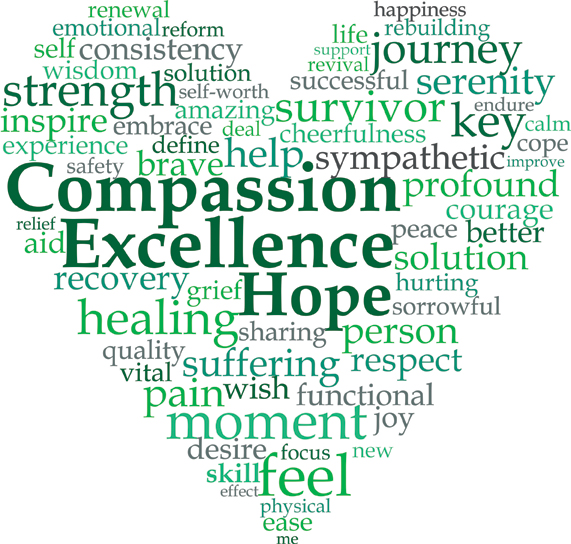Self-Care and Trauma
People who experience trauma deserve to be free from the weight and pain that it bears upon them. Throughout this class, we have discussed multiple treatment methods that can work individually or that can be used together to find the best treatment plan for the individual. Not all treatments are as widely accepted as others and one that seems to walk on that fine line is self-care. Self-care however is an important part of healing from the trauma, but it should be started when the individual is ready for that experience. Trauma affects our entire body, mind, and our whole being. When all of these aspects are affected we have a harder time being present, connecting, and relating to others. By focusing on ourselves through self-care, our mind and body can work together again to create a healthy and happy lifestyle that may have not existed before.
Highland Springs Clinic mentions that on one’s journey to healing and recovering from a traumatic event, it is important to remember the practice of self-care. They also wrote that “self-care is not commonly the first method survivors think of when they are overcoming a traumatic experience, however, it is a critical part of healing”(Hood,2020). Before starting any kind of trauma therapy, it is important to understand what trauma is and how it may present itself in you. Knowing when to start self-care is dependent on the individual and they have to allow themselves to be ready. Self-care is not the same for everyone, but listening to your body and mind and what it needs is a first step for starting this journey. Our body usually recognizes what we need and will signal to us when the time for recovery is here. Highland Springs Clinic mentions some areas of self-care that are good to start with are get more rest, find someone to talk to, journal about it, use exercise as a tool, and find engaging hobbies (Hood, 2020). While this is only a shortlist of self-care options they are good places to start for people who are ready to treat their trauma by loving themselves.
Whitney Goodman LMFT, a licensed psychotherapist brings up a good point that self-care is supposed to make us better in the long-term and that it is not a quick fix. In society now, the term “self-care is officially a commodity, and people are buying it off the shelves to prove that they care about themselves”(Goodman, 2019). It is important that people who chose self-care to help them with their trauma understand that learning to love yourself and take time for yourself is not an easy process. Goodman stated “real self-care happens in the decisions you make every day and it requires practice, commitment and putting yourself first and getting in touch with what you really need, not just what you really want”(Goodman, 2019). Her short list of self-care is: get in touch with your feelings and actual needs, practice kindness, and ask yourself “what do I need at this moment”. One big point that Goodman and Highland Springs Clinics mentioned is staying away from drinking or using substances since it is not self-care. There are so many different kinds of self-care out there, that experimenting with them will help us find which ones work for us. It is important that people who have experienced trauma believe that they deserve self-care before starting to practice it.
Everyone that goes through a traumatic experience reacts differently emotionally, psychologically, and physically. Being able to accept and be ready for the step of self-care is important to accept the responsibility for yourself, your body, and your mind. Finding a positive self-care routine when ready to embark on the journey will help the overall healing process. It is important to remember that there is no right or wrong way to self-care, it is all about what helps that individual after trauma to become whole again. Dr. Bessel Van Der Kolk writes “the full story can be told only after those structures are repaired and after the groundwork has been laid: after no body becomes some body”(Van Der Kolk, 2015, p.249). Trauma is stressful, but acting on self-care can alleviate that stress. As well as realizing that the trauma needs to be dealt with in a positive way and wanting to deal with it will help accomplish the first step with the journey of self-care.
References
Goodman, W. (2019, July 12). When Self-Care Becomes a Weapon. Psychology Today. https://www.psychologytoday.com/us/blog/healing-together/201907/when-self-care-becomes-weapon.
Ph.D., D. Julia. Hood. (2020, January 27). The Importance of Self-Care After Trauma. Highland Springs. https://highlandspringsclinic.org/blog/the-importance-of-self-care-after-trauma/.
Ocrcc. (2020, October 12). self-care Archives. OCRCC. https://ocrcc.org/tag/self-care/.
Van Der Kolk, B. (2015). The Body keeps the score brain, mind, and body in the healing of trauma. Penguin Books.

2 comments
This was a great blog post! I also did not think about self-care as the first step in trauma treatment. To be honest, self-care was not something I took seriously until the past couple years. Self-care really does not only help your mental health, but to help cope from traumatic experiences. Thank you again!
Awesome blog post. I think it is very important for individuals to begin thinking about self-care especially in a profession where your daily encounter revolves stress and solving problems. It appears as a law enforcement officer your expected to stay strong through thick and thin therefore, people forget that they are human as well. I think figuring time out of your day to take care of yourself is highly important because as they say, how are you suppose to take care of others if you cant take care of yourself!
Comments are closed.